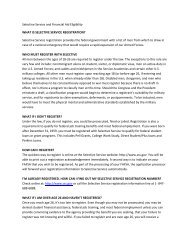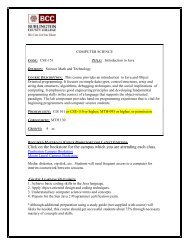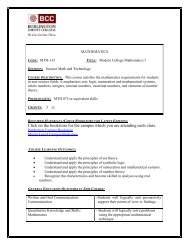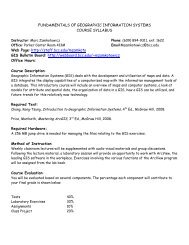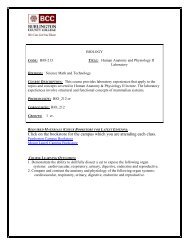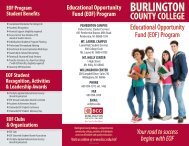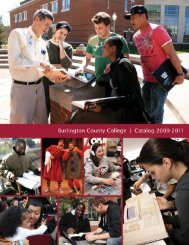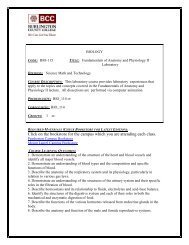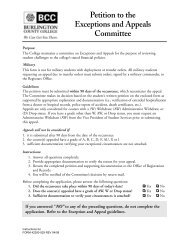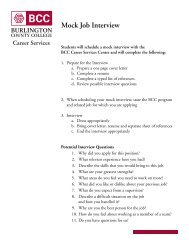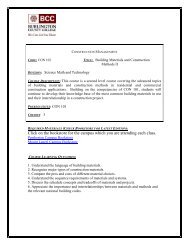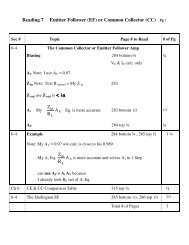Computer Science - Burlington County College
Computer Science - Burlington County College
Computer Science - Burlington County College
Create successful ePaper yourself
Turn your PDF publications into a flip-book with our unique Google optimized e-Paper software.
Direct Lending<br />
<strong>Burlington</strong> <strong>County</strong> <strong>College</strong> participates in<br />
the William D. Ford Federal Direct Loan<br />
(Direct Loan) Program. Under the Direct<br />
Lending Program, the funds for your loan<br />
come directly from the federal government.<br />
This program is available to students<br />
enrolled in a minimum six credits (part-time)<br />
per semester. In addition to completion of<br />
the FAFSA, borrowers must complete a<br />
master promissory note and a loan entrance<br />
interview. Loans are repayable after<br />
graduation or when you enroll less than<br />
half time. For additional information<br />
about student or parent loans, visit the<br />
Direct Lending section on<br />
www.bcc.edu/financialaid.<br />
Student Employment<br />
Federal Work-Study Program (FWS)<br />
FWS is a federal employment program in which<br />
the government allocates funds to the institution<br />
to employ students on campus to help them pay<br />
for their education expenses. FWS is available<br />
to degree-seeking students enrolled for at least<br />
six credits and who show financial need.<br />
Students generally work an average of 15<br />
hours per week. Recipients must be U.S.<br />
citizens or permanent residents and must be<br />
making satisfactory academic progress. In<br />
order to receive consideration for the FWS<br />
students must file the Free Application for<br />
Federal Aid (FAFSA) each year.<br />
Institutional Work-Study<br />
(“140” Employment) Program<br />
This is an institutional employment program in<br />
which the college makes employment available<br />
for full or part-time students. Students<br />
generally work an average of 15 hours per<br />
week. Applicants must also submit a student<br />
employment application. Students who apply for<br />
the institutional employment program must first<br />
use their FWS eligibility or not be eligible for FWS.<br />
How Aid is Awarded<br />
Unless otherwise noted as a merit-based<br />
scholarship, financial aid is awarded to students<br />
solely on the basis of their financial need.<br />
Financial need is the difference between a<br />
student’s cost of attendance and their financial<br />
resources, as determined by BCC using the<br />
student’s FAFSA.<br />
Cost of Attendance<br />
The student’s cost of attendance includes<br />
allowances for such items as tuition, fees, books,<br />
supplies, room and board, personal expenses<br />
and transportation for one academic year, fall<br />
and spring semesters.<br />
Resources—Expected<br />
Family Contribution<br />
The family’s expected contribution is computed<br />
from the data the family submits on the FAFSA<br />
to the Department of Education. If you are a<br />
dependent student, it comprises the parent’s<br />
contribution and the student’s contribution from<br />
income and assets. If you are independent, it is<br />
based on your and, if married, your spouse’s<br />
income and assets.<br />
Other Resources<br />
Other resources may include government<br />
education benefits, employer tuition payments,<br />
veteran benefits, and other payments made to<br />
your student account by outside third parties.<br />
All other resources are used in determining<br />
your financial need and must be reported to<br />
the Financial Aid Office.<br />
Outside Aid<br />
Outside aid is typically a BCC Foundation<br />
scholarship, veteran benefits or other private<br />
scholarships. All outside aid is used in<br />
determining need and must be reported to<br />
the Financial Aid Office.<br />
General Eligibility Requirements<br />
To qualify for federal, state, BCC need-based<br />
financial aid and most assistance other than<br />
scholarships, you must meet general<br />
eligibility requirements:<br />
Have a high school diploma, GED or<br />
equivalent<br />
Be enrolled or accepted for enrollment in<br />
a degree or certificate program<br />
Be a U.S. citizen, U.S. national or eligible<br />
non-citizen.<br />
If you are selected for verification by the<br />
Department of Education or BCC, complete<br />
the verification process prior to disbursement<br />
of any financial aid funds.<br />
Maintain satisfactory academic progress in<br />
your degree or certificate program of study.<br />
Not be in default on a federal student loan.<br />
Not owe a refund on a federal or state grant.<br />
Demonstrate financial need to qualify for<br />
need based funds.<br />
Meet the defined criteria for each financial<br />
aid program.section of the BCC website.<br />
26 <strong>Burlington</strong> <strong>County</strong> <strong>College</strong><br />
Financial Aid Satisfactory<br />
Academic Progress (SAP) Policy<br />
All students receiving student financial aid<br />
from federal, state or institutional sources<br />
must make satisfactory academic progress<br />
(SAP) at <strong>Burlington</strong> <strong>County</strong> <strong>College</strong> (BCC).<br />
SAP is monitored at the end of each semester<br />
for aid recipients who are degree-seeking or<br />
pursuing a certificate. SAP measures a<br />
student’s performance for all terms of<br />
enrollment, including terms in which the<br />
student does not receive financial aid. The<br />
three requirements measure cumulative<br />
grade point average, percent of credits<br />
earned relative to those attempted, and<br />
percent of attempted credits, including<br />
transfer credits, relative to the credits<br />
required for program completion.<br />
A financial aid applicant is responsible for<br />
knowing the Financial Aid SAP Policy. The<br />
Financial Aid Office sends a notification of aid<br />
eligibility (or ineligibility) to a student who<br />
has been placed on probation or unsatisfactory<br />
status. Whether or not a student<br />
receives the notification, responsibility for<br />
meeting the minimum SAP requirements to<br />
qualify for student aid remains with the<br />
student. Students who are ineligible for aid<br />
may enroll at BCC if they are able to pay for<br />
tuition and fees. Payment arrangements can<br />
be made by contacting the BCC Business<br />
Office.<br />
To maintain satisfactory academic<br />
progress and aid eligibility, an aid<br />
recipient must meet all three of the<br />
following minimum requirements.<br />
1. Completion Rate<br />
A student must successfully complete a<br />
minimum of 66.67% of all credits attempted<br />
to be making Satisfactory progress and<br />
maintain aid eligibility. Credits with a grade<br />
of A, B+, B, C+, C, D, or P are successfully<br />
completed.<br />
If a completion rate is below 66.67%, a<br />
student will be considered on Unsatisfactory<br />
status.<br />
2. Maximum Time Frame<br />
A student must complete a program of study<br />
within 150% of the number of credit hours<br />
required for degree graduation or certificate<br />
completion to be making Satisfactory<br />
progress and maintain aid eligibility. The<br />
150% is measured on the basis of attempted<br />
credits, including transfer credits. For<br />
example, if an associate’s degree program<br />
requires 64 credits for graduation, it must be<br />
completed within 96 credits to maintain aid<br />
eligibility. Since credit hour requirements for<br />
academic programs vary, check the <strong>College</strong><br />
Catalog for the precise number of credits<br />
required. Multiply the number by 1.5.



